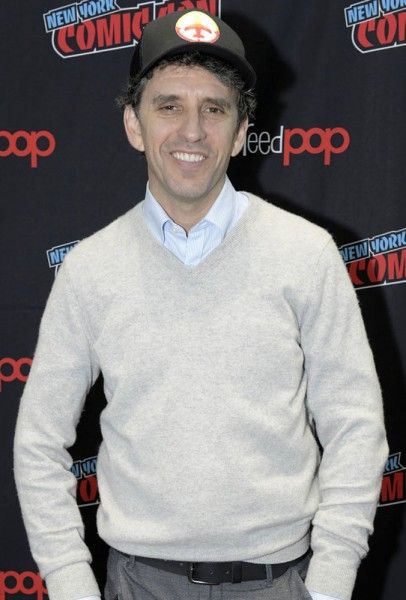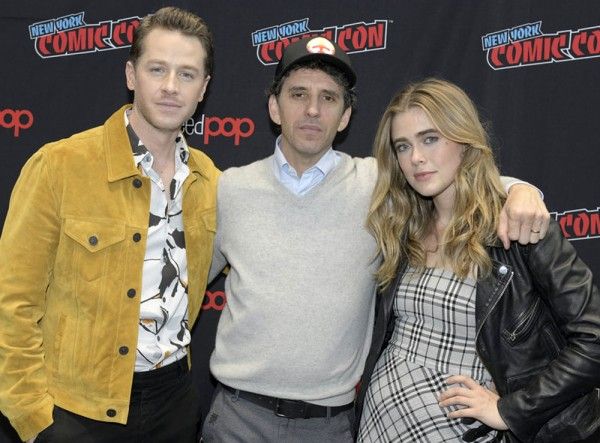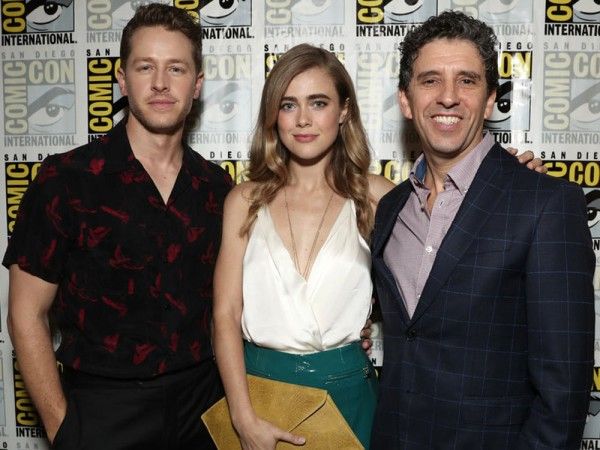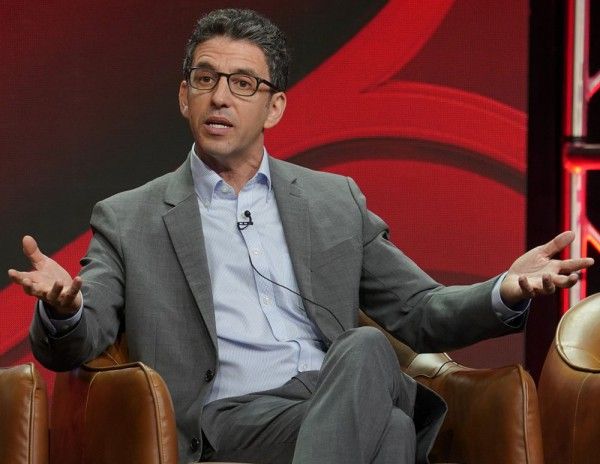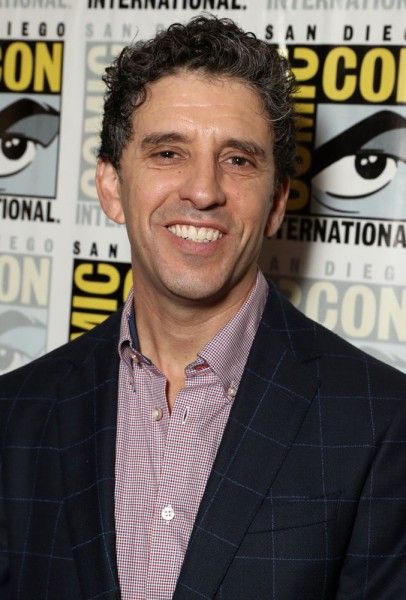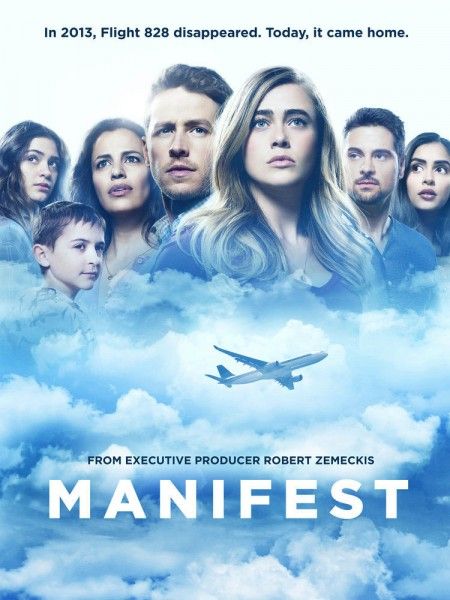The NBC drama series Manifest tells the story of what happened to the passengers and crew of Montego Air Flight 828, after they survive a very turbulent flight, but land safely, only to find out that more than five years have passed and their families, friends and colleagues have all aged, in that time. They quickly realize that they’ve all been given a second chance, but the mystery of why and how has no easy answers.
During this 1-on-1 phone interview with Collider, creator/showrunner Jeff Rake talked about how the idea for Manifest has evolved since he first came up with it, 10 years ago, his six-year plan for the series, putting together a diverse and inclusive writers’ room, how much the series is a family drama vs. how much it will be forwarding the mythology, whether all of these mysterious missions for the passengers are being done for good reasons, whether viewers should be paying attention to the little details, and the challenges of being a showrunner on a TV series. Be aware that there are some spoilers discussed.
Collider: You’ve talked about how you came up with this idea 10 years ago, and that you also had a six-year plan for it. Did you have all of that, at the time that you first came up with it, or have you been developing it in your head, over all this time?
JEFF RAKE: A little of both. That is the true origin story. I landed this idea over a decade ago and, at that time, I always knew the end game. When I originally hit on the concept, I knew the beginning. I knew that I wanted this to be about a separated family and throwing at them the most tantalizing, impossible obstacle conceivable, in order to tear them apart and bring them back together again. Thus, the missing airplane. In my first incarnation, I did basically have a sense of the ultimate end game, but as anyone who watches or writes television knows, there’s a long way from the beginning to the end. Over the course of the years after I was unsuccessful in getting anyone to bite at the concept, it spent a few years on the shelf. And then, I would noodle with it, and give it more shelf time. And then, I would try to get a producer interested, and noodle with it. Ultimately, I was lucky enough to get Warner Brothers and NBC excited about it last summer. Over the years, I certainly iterated on it throughout. I found some important middle plateaus. And then, it came to me in one fell swoop. The many layers that I intend to bring to the show have been the result of my own contemplating, over the years. Now that I’m working with eight incredibly talented writers in the room with me, I have the benefit of collaborating with all of them to fill in all the gaps in between.
You’ve also talked about how proud you are of the diversity on this show, both in front of and behind the camera. How did you approach putting the writers’ room together? Did you find it easy to put a more inclusive group together?
RAKE: I certainly have. The truth of the matter is that it wasn’t that hard to find them because there’s an incredibly talented pool of writers in Hollywood. The hardest thing to do in the television business is to get that first job. Whether you’re an aspiring writer, a director, an actor, or a camera operator, the challenging thing is that the talent pool is so far and wide, how do you get yourself noticed? I had the benefit of being inundated with spec scripts, which is the calling card of aspiring writers. As I was shooting the pilot, I was making my way through metaphorical piles of scripts, just because they’re really PDFs on my iPad. The truth of the matter is that within the mountain of spec scripts, you read many wonderful scripts, which narrows your list down somewhat. You meet with people whose scripts really impressed you, and then you have a bunch of great meetings. Am I keeping my eye out deliberately to cast the writers’ room s diversely as you try to cast the screen diversely? Of course. It’s something in the back of your mind, as you’re figuring out who you want to read and who you want to meet with. First and foremost, it’s about quality. If I read an excellent script, I’ll meet with that person. If I have an excellent meeting with them, they’re on my shortlist to get the job. As it happens, that narrowing down led to more qualified candidates than I had seats for in the room. You want to make sure that you’re representing diverse points of view, in regard to gender, ethnicity, sexual orientation, age, and where and how a person grew up. The show is about a cross-section of humanity, and I’m proud to report that the room really reflects that.
This show is part character and family drama, and part mythology. How soon will we start getting some answers to the mythology of it all? How long do you want to keep us wondering about certain things versus giving some answers, even if they’re not the bigger answers?
RAKE: It’ll be a slow burn. Every episode will be a pretty even balance between relationship drama moving the ball forward in the key relationships that we’re tracking in the episode, and pushing along mythology while also carrying a close-ended procedural story of the week. We have Ben (Josh Dallas) and Grace (Athena Karkanis), our husband and wife characters at the center of the show, and that marriage has been rocked by the fact that she’s been seeing someone new in her life. We have Michaela (Melissa Roxburgh) and Jared (J.R. Ramirez), and he’s married to her best friend now, which is another complicated relationship triangle that inches along. There’s drama with the parents and kids. And then, the procedural story typically touches upon our ultimate mythology because what the audience will come to discover is that these mystifying abilities that our planes passengers find themselves burdened or blessed with, ends up informing our close-ended mission of the week. As we’re tracking a mission, we’re also learning a little bit more about how the mythology plays out in the show and what exactly is happening to people. It’ll be kernels along the way, but we touch on mythology every week. The audience is on a parallel journey with our protagonists, as they attempt to decipher the ultimate answer. At episode 13, there’s a big reveal. And then, we’ll turn over a big card, mythology-wise, at Episode 22, should NBC bless us with our back order in Season 1. Throughout the seasons, there will be a couple of times where there’s a bigger reveal, but then there will also be small little reveals each week. Hopefully, people are paying close attention.
Are we supposed to believe that everything that’s happening with the individuals on the missing flight is being done for good, or will some of what’s happening start to be questionable?
RAKE: As early as Episode 4, things start going sideways, and it’ll cause our heroes to question what’s happening. To put a finer point on that, Ben is the skeptic, while Michaela is the believer. Like Mulder and Scully, they are forever looking each other in the eye and having that debate about whether they should be blindly going along with where they’re being guided, or if they can even trust what they’re hearing and seeing. After a couple of episodes, they start to fall into a pattern of complacency, but as soon as they get there, the rug will be pulled out from under them. As we get deeper into the season, they’ll have increasingly understandable reasons for questioning what’s happening. That element of doubt is an important part of the journey.
When you technically have an ensemble cast of over 200 people, with everybody from the plane and everybody connected to those people, do the biggest challenges come from just finding ways to tell as many stories as you can?
RAKE: No, that’s not the biggest challenge. We are overflowing with stories in the writers’ room. The biggest challenge is more of a production challenge, in the sense that we want to and have been featuring the lion’s share of the passengers by flashing back onto the plane and spending time, again and again, with them in the immediate aftermath of the plane’s landing. What’s problematic, from a production standpoint, is being able to show the audience dozens of passengers. If you think about how television is made, in a typical television scene or movie, when you’re focusing on character one and character two, but there are 20 people behind them who are part of the same scene, those are background actors who haven’t really been cast or auditioned. The challenge then is how to avoid featuring all of the background passengers too closely, so that we have the freedom to audition and cast whoever we want, when we ultimately start telling the stories of other passengers from the plane, in later episodes, without savvy viewers going back to Episodes 1, 2 and 3 and saying, “Wait a minute, I don’t remember that person on the airplane.” That’s the biggest challenge with a cast of 200.
When you do a show like this that involves a plane, you’re going to get comparisons to Lost, whether that’s fair or not. As far as that goes, one thing that show taught us was that you have to pay attention to all of the little details. Should we be doing that, on a show like this, with things like the date of the flight or the flight number or the number of passengers? Did all of these people end up on this plane for a reason?
RAKE: I’d encourage the audience to pay close attention to everything. Anything that’s featured and highlighted, either in dialogue or in a specific cutaway shot to a number or an object, is intentional. We are deliberately planting seeds, and a lot of them will grow into story strands, over the course of the seasons. It’s an organic a process. As we plant these seeds in the writers’ room, we spend a lot of time thinking about where we think the most important strands are and which are the ones that require the most development. Sometimes things will pay off in a huge way. Sometimes they’ll pay off in a small way. I’m sure there will inevitably be elements that the viewers watch and are waiting for something to come of it, and then, after a time, you’ll say, “Wait a minute, why didn’t that pay off, in some way?” The audience may latch onto something that they thought was significant, but that the writers did not intend to make significant. I think that’s inevitable, in any show, but we certainly do think about what you’re asking about. There are some little puzzle pieces that will appear in the background that matter, and I’d encourage everybody to keep a close eye out.
As the showrunner of a TV series, people give you the credit for all the success, they blame you for all the failures, and they turn to you for the answers to all of their questions. That first day that you walked onto a set as the showrunner, did you immediately know that it was something you wanted to keep doing, or did you have a moment of panic, at any point?
RAKE: You panic, every day, at every next step. You pitch the show and everybody says, “Oh, my god, that’s amazing!” And you go, “Oh, my goodness, I have to write that show!” That’s a panic moment. And then, you write your script. I wrote the script and I was really proud of it, and I spent many months developing it with my studio and network, and got it to a place we were all incredibly excited about it. And then, you say, “But who’s gonna play these parts?” And then, you’ve got a great cast and you go to film and you think, “What if it just doesn’t come together?” And then, your director crushes it. My pilot director, David Frankel, was a godsend. You film the pilot, and then you go, “It has legs, but is there a second episode?” Even if you have your roadmap, “Can I get the second episode down on paper? Am I going to find a writing staff who is gonna help me achieve this?” And then, you hire these amazing people and you start filming. Of course, at every step along the way, there is fear, panic and trepidation, but so far, all of the pieces are coming together. The next big step, or big panic point is, about how the audience will respond to it. One of the things I’m proudest about, in regard to the show, is that it’s given the ensemble, the various walks of life that our characters come from, and the mix of supernatural and grounded relationship drama, a lot of story strands and we cross a few genres. I think that there’s a lot for the audience to latch onto, each week.
Manifest airs on Monday nights on NBC.


